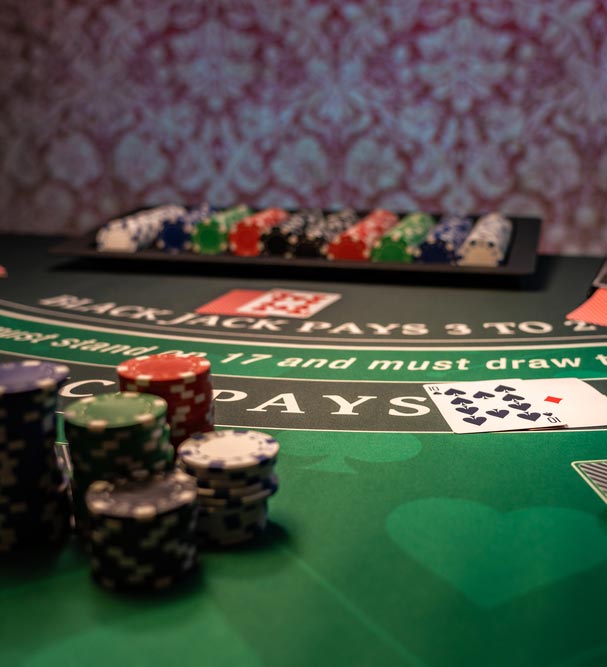Key Takeaways
- Splitting a pair of 7s in blackjack is a decision influenced by the dealer’s upcard.
- Against a dealer’s 9, it’s generally not advised to split 7s.
- The basic strategy is a guide to minimize the house edge and should be understood for making informed decisions.
Should You Split 7s in Blackjack?
Dealer’s Upcard: 9
- Your Hand: 7 + 7 = 14
- Recommended Action: Do not split.
The rationale:
- The most likely card for a player or dealer to receive at any time is a 10, because there are more of these in the pack than any other card.
- Therefore, the dealer has a high chance of ending up with a total hand of 19.
- If you get a 10 on your 14, you’re going to bust, but splitting your 7s and receiving a 10 is only going to give you 17, which is still short of the mark vs the dealer.
- If you split, you are making a second bet with the hopes of improving both hands, yet there is a high risk that you could end up with two weaker hands, each starting with 7, against the dealer’s potential 19.
- By not splitting, you avoid adding bets on what is most likely to be a losing hand. The objective is to make a decision that doesn’t excessively increase the house’s edge over you.
Pair Splitting Strategy
When you’re dealt a pair of 7s, for instance, the basic strategy says you should generally split if the dealer’s upcard is between 2 and 7. Conversely, against a dealer’s upcard of 8 or higher, you’re often better off not splitting, as the dealer has a stronger position and is less likely to bust.
- Dealer’s Upcard 2-7: Split your 7s.
- Dealer’s Upcard 8-9, face cards, or an Ace: Do not split.
Do you split 4s against an 8?
No, you should not split a pair of 4s against a dealer’s 8. It is generally advised to hit because splitting could lead to two weak hands while hitting gives you a chance to improve one single hand.
Is it advisable to split 9s against a dealer’s 9?
Splitting a pair of 9s against a dealer’s 9 is a bold move, as you’re aiming to build two hands with a strong starting point of 18. However, this move is often not recommended because holding on to an 18 is a fairly strong position that doesn’t warrant the risk of splitting.
What is the best strategy when you have a pair of 8s versus a dealer’s 10?
When you’re dealt a pair of 8s and the dealer’s upcard is a 10, the best strategy is to split. This aims to give you a better chance to make a stronger hand, as holding at 16 is not a favorable position against a dealer’s 10.
Can you explain why players might not split 9s against a dealer’s 7?
A dealer’s 7 is not a strong upcard, and by splitting 9s, you could turn a strong total of 18 into two less advantageous hands. Standing with 18 usually gives you a better chance of winning, as the dealer is more likely to bust or achieve a lower total.
What are the instances where you should never split cards in blackjack?
You should never split 10s or 5s. A pair of 10s is a strong hand, and splitting them can drastically reduce your chance of winning. Splitting 5s is equally disadvantageous since you are breaking up a strong starting point for a potentially strong hand, like a 10 or 20.
In what scenarios is splitting 8s the preferable strategy?
Splitting 8s is almost always the best strategy, regardless of the dealer’s upcard. This is because 16 is a weak hand that does not fare well against any dealer upcard, whereas splitting gives you a chance to improve your situation with two separate hands starting from 8.
Are you supposed to split 9s?
In blackjack, it’s strategic to split a pair of 9s except when the dealer shows a 7, 10, or Ace. Opt to split against dealer upcards 2-6 or 8-9. This move maximizes your chances of winning by leveraging a strong starting hand against weaker dealer cards.
What cards should you never split in blackjack?
In blackjack, you should always avoid splitting 10-value cards, such as 10s, Jacks, Queens, and Kings, as well as pairs of 5s. Holding onto a 20 is a strong hand while splitting 5s could lead to a less advantageous situation. Stick to these guidelines to improve your odds of winning.
Should you split 8s against a 7?
Yes, you should split a pair of eights when facing a dealer’s seven. This strategy reduces the house edge, as holding two separate hands starting with eight is statistically more advantageous than playing 16 against a dealer’s seven. Splitting eights enhances your winning chances in this scenario.

